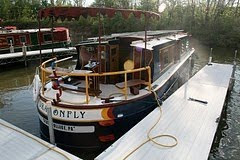 |
| French toast and energy strategies! From left, Cap, Bill and Lynn Hering, Frederick and Sheila Dryer |
The place we chose was crowded--every table and seat at the bar taken. So we were about to wander out when a woman hailed us: "Are you guys boaters? Sit with us!"
And . . . what are the chances? We operate a solar boat. Lynn and Bill Hering have been involved with some of the nation's largest solar installations.
Bill and Lynn also know wind. And nuclear. They work in corporate safety for a company that handles electrical installations on large projects--like power plants.
We had a wide-ranging conversation about the nation's energy future. (Bill's assessment: "Solar is good but it's never going to meet more than a fraction of our needs. Nuclear is the way to go.") Bill also, "You HAVE to meet my friend from Princeton, he's an energy engineer. Can you have breakfast tomorrow?"
Indeed! Saturday at 7 AM we were serving French toast on the boat to Lynn and Bill AND Dr. Frederick Dyer and his wife Sheila. Dr. Dryer's field is fuel science . . . specifically, "How do you burn that stuff in a such a way that it yields the most energy AND the fewest greenhouse gas emissions? Talk about your power breakfast!
And speaking of greenhouse gases, Dryer also has some ideas about "What do we do with the carbon dioxide we inevitably generate?" He says we can put it to work in the oil industry.
If you're from Pennsylvania you know all about fracking. Companies drilling for natural gas inject water into layers of shale rock, fracturing it and releasing the gas. Turns out, the oil industry uses carbon dioxide in a similar way--injecting it into wells to help bring gas to the surface.
Currently, the oil industry mines its carbon dioxide from naturally occurring underground reservoirs. Which means the oil industry already has thousands of miles of pipeline in place to move the stuff around to where it's needed.
Dryer says, instead of extracting a raw resource from underground, why not recycle? America could recover carbon dioxide emissions from power plants and other sources and put THAT gas to work in the oil fields. The result is not a form of carbon sequestration--although researchers think much of the carbon dioxide injected into oil wells remains underground for the long term.
It's not a long-term solution for our energy needs. But it's a creative way to take an existing industry and make it a little greener.
If you know more about this issue, please share your thoughts!





No comments:
Post a Comment